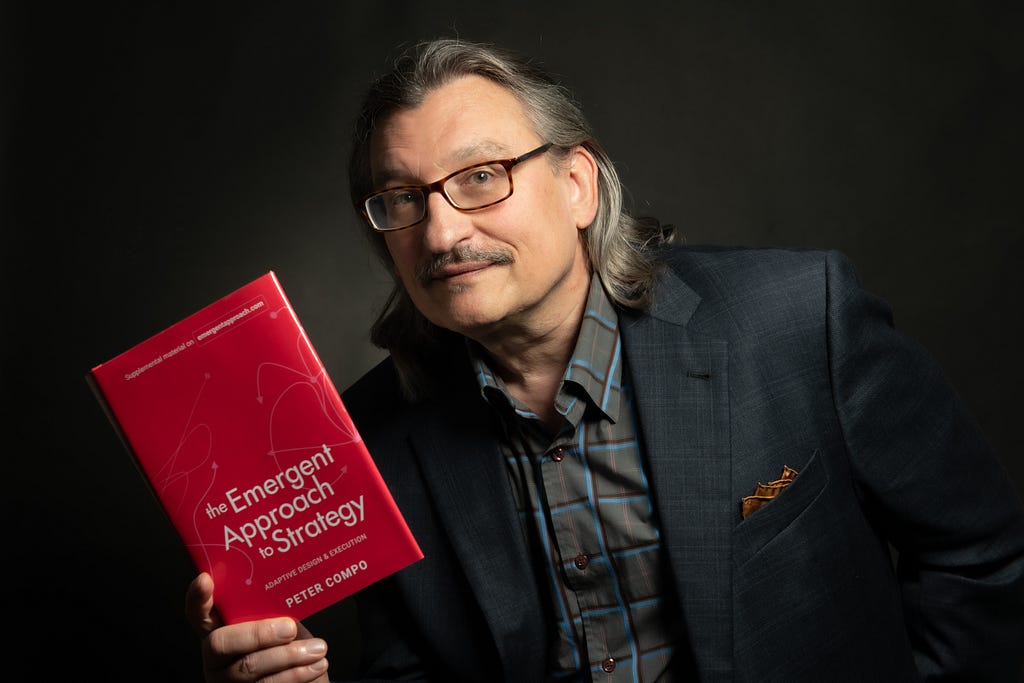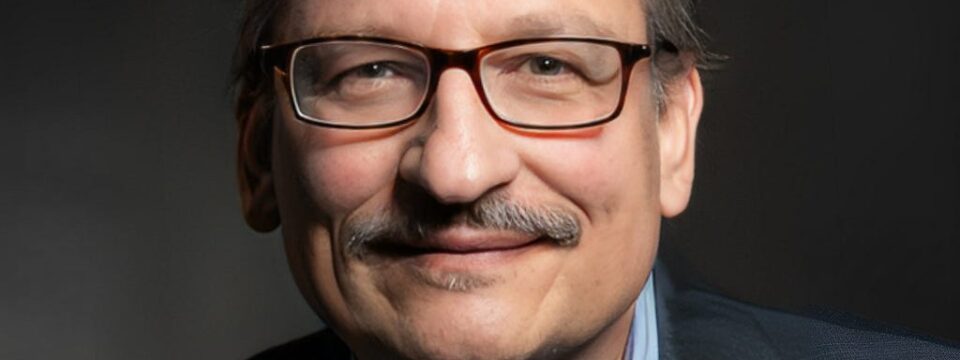Author Peter Compo of the Emergent Approach to Strategy On Five Things You Need To Be A Highly Effective Leader During Uncertain & Turbulent Times

I believe most leaders would argue that they waited too long to face up to bad news. Always in the hope that there will be a resolution or a miracle. Of course, overreaction is a danger too.
As part of our series about the “Five Things You Need To Be A Highly Effective Leader During Turbulent Times”, we had the pleasure of interviewing Peter Compo.
Peter Compo is the author of The Emergent Approach to Strategy: Adaptive Design & Execution. Compo earned a Ph.D. in Chemical Engineering from the City College of the City University of New York. But unlike many strategy authors from universities and consulting firms, Compo’s professional experience was spent working in the “corporate trenches” at E.I.DuPont, the multinational chemical, biological, and materials company. Hired as a research scientist, he went on to hold leadership positions in product management, marketing, supply chain, business management, and integrated business planning. He left DuPont after 25 years to work full-time on developing the emergent approach. His mission is to bring a new level of clarity to strategy theory and practice enabling organizations in any domain to achieve their aspirations. Compo comes from a multi-generational family of musicians in the New York City metropolitan area.
Thank you so much for your time! I know that you are a very busy person. Our readers would love to “get to know you” a bit better. Can you tell us a bit about your ‘backstory’ and how you got started?
I came from a musical family in New York City. And while music has remained important to me, I didn’t have an easy start in life and needed the structure school provides. I migrated to studying sciences and chemistry, eventually earning a Ph.D. in Chemical Engineering at City College of the City University of New York.
I then joined E. I. Dupont as a research scientist and held diverse leadership positions in supply chain, marketing, product and business management. I was the director of DuPont ventures and led the corporate effort for integrated business planning.
All along, I held a keen interest in how change and innovation occurred. I concluded early on that creativity and innovation in science, technology, business, and even music is an adaptive process. I was frustrated by the decidedly non-adaptive methods of strategy design and execution in the consulting-corporate-academia complex.
I started taking notes and developing theory and practice. After 25 years at DuPont, I left work full time on strategy, creativity, and innovation and published my book, The Emergent Approach to Strategy: Adaptive Design and Execution.
It has been said that our mistakes can be our greatest teachers. Can you share a story about the funniest mistake you made when you were first starting? Can you tell us what lesson you learned from that?
My mistakes don’t seem funny, even in hindsight. Let’s just say it’s a bad policy to get into arguments with executive VPs three months after starting your first job. In fact, if you want a successful corporate career, it’s best not to be argumentative with anyone.
None of us are able to achieve success without some help along the way. Is there a particular person who you are grateful towards who helped get you to where you are? Can you share a story?
People gave me chances to move in a positive direction early on. They saw something in me.
Extensive research suggests that “purpose-driven businesses” are more successful in many areas. When your organization started, what was its vision, what was its purpose?
Understanding how creativity, change, and innovation occur — both in my journey and for others — drives everything I do. Even in music!
Thank you for all that. Let’s now turn to the main focus of our discussion. Can you share with our readers a story from your own experience about how you lead your team during uncertain or difficult times?
For many, it is easier to lead in turbulent times. There are fewer choices, and often time horizons are shorter. But does great leadership involve preparing with a robust strategy design such that turbulent times are an opportunity instead of a negative? Do we admire hero culture? Leaders who do great things, or appear to do great things, during times of crises and turbulence. We don’t read much about leaders who quietly position a company to avoid crises.
Did you ever consider giving up? Where did you get the motivation to continue through your challenges? What sustains your drive?
Sure. Many times. And it is a great question where the drive to persevere comes from. Adaptive theory would say people who persevere do so because they do not see any other option, no other choice. My motivation comes from the need to complete my mission and the optimistic belief that I can keep improving.
I’m an author and I believe that books have the power to change lives. Do you have a book in your life that impacted you and inspired you to be an effective leader? Can you share a story?
I read the biography of Marie Curie years ago, and it influenced my thinking in many ways. She led by example. She was always prepared. She studied first and gave opinions later. She worked for the good of humankind, not personal success. I wish I could be more like her.
What would you say is the most critical role of a leader during challenging times?
Stay true to your strategy or change it if you can articulate strong arguments that something is wrong with it — this is execution.
When the future seems so uncertain, what is the best way to boost morale? What can a leader do to inspire, motivate and engage their team?
The obvious is not to panic.
However, I think a rarely-made point is that it is wrong to equate turbulence and uncertainty. The future is always uncertain. There is no reason to believe that the future is more uncertain during turbulent times.
For instance, at which time was the future more uncertain? Before the 2008 Lehman Brothers collapse, when everyone was drowning in money, and the only turbulence was the frustration 30-year-old hedge fund rookies felt because there were not enough $25 million Central Park South penthouses available to buy. Or was it after the collapse when it became evident that we had been in a bubble? Before Lehman collapsed, the country was about to fall off a cliff. The fact that only a few people warned of this reality does not mean the future was not uncertain. I think the future was more certain during the turbulence of climbing out of the mess.
The same argument applies to the 2001 dot com bust, the 2001 crash after Covid, or any other event that led to turbulence. Note that crises-causing events often come in pairs, dot com and 9/11; covid and Ukraine.
What is the best way to communicate difficult news to one’s team and customers?
I believe most leaders would argue that they waited too long to face up to bad news. Always in the hope that there will be a resolution or a miracle. Of course, overreaction is a danger too.
How can a leader make plans when the future is so unpredictable?
This is where scenario thinking comes in. There are always multiple plausible futures. Scenarios are an important technique for incorporating different futures into your strategy framework. Scenarios are tricky, however, and require good technique and understanding. Scenarios do not involve just imagining how things could be different as an add-on activity after designing your strategy.
Is there a “number one principle” that can help guide a company through the ups and downs of turbulent times?
Again, stay true to your strategy or change it if you can articulate strong arguments that something is wrong with it — this is execution.
Can you share 3 or 4 of the most common mistakes you have seen other businesses make during difficult times? What should one keep in mind to avoid that?
- Change strategy (unless there is a good reason)
- Blame the people
- Blame the problems on “outside” factors that should have been considered in the strategy in the first place.

Here is the primary question of our discussion. Based on your experience and success, what are the five most important things a business leader should do to lead effectively during uncertain and turbulent times?
- Prepare with a true strategy framework based on deep insight, not a recipe.
- Use scenarios in your framework🡪 Ikea has stated that they no longer use forecasts, only scenarios. Predicting the future is not generally a good practice.
- Be prepared to take advantage of the crises if you have been well run 🡪 See a McKinsey article on the success of programmatic M&A. A strong company with a strong balance sheet will be able to pounce on opportunities from a position of strength and insight.
- Don’t waste a crisis 🡪 DuPont used the aftermath of the 2008 banking crisis to make structural changes that would have been much more difficult during “normal” times. Unfortunately, the changes were not fundamental enough to stave off activist board demands to break up the company several years later.
- Communicate more than usual. Think Churchill in WWII.
Can you please give us your favorite “Life Lesson Quote”? Can you share how that was relevant to you in your life?
Now you’re getting personal. But there is a beautiful quote. I don’t remember who said it originally, but it was passed on to me by Sam Severance, who was my boss when I was working in the titanium dioxide business of DuPont. Sam was a thoughtful leader.
The quote reads, “It is never too late to be the person you want to be.” For someone like me who has struggled and didn’t have an easy path, the sentiment of this quote is a powerful guiding Light.
I think it is relevant to uncertainty and turbulence too. Sometimes a crisis is the perfect time to make a significant change and move towards being who you want to be, either as a person or an organization.
How can our readers further follow your work?
Here are the essential links:
Find my book 𝗧𝗵𝗲 𝗘𝗺𝗲𝗿𝗴𝗲𝗻𝘁 𝗔𝗽𝗽𝗿𝗼𝗮𝗰𝗵 𝘁𝗼 𝗦𝘁𝗿𝗮𝘁𝗲𝗴𝘆: 𝗔𝗱𝗮𝗽𝘁𝗶𝘃𝗲 𝗗𝗲𝘀𝗶𝗴𝗻 𝗮𝗻𝗱 𝗜𝗺𝗽𝗹𝗲𝗺𝗲𝗻𝘁𝗮𝘁𝗶𝗼𝗻 here: https://amzn.to/3zOHYcz
My website, www.emergentapproach.com, includes chapter supplements, additional examples, templates, and questionnaires for evaluating your strategy and 5 Task Sets. The Task Sets are a guidebook for using the Emergent Approach with many examples.
For additional background and many posts on the theory and practice of the emergent approach, see my profile on LinkedIn: www.linkedin.com/in/petercompo
Feel free to contact me at [email protected] with any questions or comments.
Thank you so much for sharing these important insights. We wish you continued success and good health!
Author Peter Compo of the Emergent Approach to Strategy On Five Things You Need To Be A Highly… was originally published in Authority Magazine on Medium, where people are continuing the conversation by highlighting and responding to this story.
